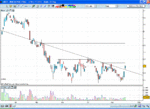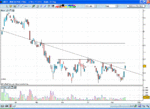firewalker99 said:
wasp, hope you don't mind me putting this up here but as you were busy doing the calculus, perhaps you'd be interested in finding your confidence level. Which actually gives a good indication whether are not your system is prepared for losing streaks and has balanced the more extreme wins which could influence your profit:loss otherwise.
Basically, it's what these two gentlemen said:
Take x = ABS (Average Profit) * (Number of Trades)^0.5 / (STDev of Profits)
Standard deviation can be easliy calculated using Excel or any other spreadsheet. The larger your stdev, the lesser confidence level. A consistently profitable strategy would also have a fairly consistent target or loss with the occasional drawdown or "lucky big bucks" imho. Like trendie says, removing the best 5% or like dbphoenix says, determining the maximum loss, both are in a way part of this equation.
The average profit can be negative, but in your case it doesn't appear to be the case 🙂
0 -> 50%
0.126 ->55%
0.25 ->60%
0.52 ->70%
0.67 ->75%
0.84 ->80%
1.04 ->85%
1.28 ->90%
1.645 ->95%
2.05 -> 98%
3.0 ->-- 99%
Good stuff, and if it helps you, use it, for me, I am confident in my plan and its just a case of discipline rather than stats, I just included them to see what they worked out at.
dbphoenix said:
Actually, what I said has nothing to do with standard deviations or levels of confidence.
Keep it simple.
Db
Not really interested in standard deviations but the confidence part is important. How you reach your levels of confidence, be it %'s, backtests, forward tests or live trading, aquiring a level of confidence is vital to be able to pull the trigger and stay in a trade until your strat tells you to exit.
This is why I started the journal originally because I was panic exiting as I had no faith in my plan. Its not until I started this and said to myself that I have to trust it and then started producing the results I should be that my confidence levels grew. This is just my way of doing this and building faith.
firewalker99 said:
What would the possible scenarios be then, if one were to encounter another similar losing streak?
Like I have said to you before, I personally limit my daily trades to account for the flat choppy days. This usually means I am done by midday and then I walk away. The only exception being NFP and FOMC days when I am sometimes inclined to wait.
What you do need to do is once you have decided on your business/trading plan is test every possible scenario until you find the best/most profitable way for you. I tried various strats to limit the bad days and the bad runs and lots of backtests and figures and excel calculations this worked best for my risk reductions and overall goals.
firewalker99 said:
It was only a suggestion of a basic scientific principle, I apologize if you find me quoting you inappropriate. Nevertheless, determining the maximum loss over a time period has a lot to do with looking at the distribution of your results.
I agree this calculations can help. Once you have decided on your strategy, you can then work these out and decide wether it suits you. I personally have numerous calculations via different means and have the black and white proof I can profit from my plan and its mainly excel related but again, this is just me.
firewalker99 said:
I'm not looking for ALL of the answers, I was merely trying to figure out what could be possible starting points. I'm not expecting to be told what to do, but as someone adviced me to go to T2W to look for advice, I was hoping to get back on track in the right direction. Honestly, when I read some comments to novices (like myself) in the likes of "just study the market", "just look and observe and feel the flow", "forget about everything you've learned",... I begin to understand why people spend so much money on books and trading courses, they are left over to finding it out all by themselves. And although some people are perhaps able to succeed without any help, I believe most of us do need something to get a grasp on.
I do get agitated when more experienced traders call those novices "lazy" because there not willing to spend hours swimming in the worldwide ocean without having a clue what to look for. Seems like looking for a needle in a haystack for most. Personally, I've started off the wrong foot, I'd be the first to acknowledge that I've never should have started trading without a tested plan and I've be punished for that in more ways that only financially.
On the other hand, I've been looking at realtime charts without trading for 10hours a day, for over months now. Dozens of books, articles, interviews... some harder to digest than others. And then when you're trying to make something useful of it, you're mixing it all up exactly because the overload of information. People tell you to forget of all that and start from scratch all over. I'm still continuining in my efforts, but I wonder at what point they may seem in vain, if it results in nothing more than wandering around in circles. But perhaps that too is a process we must go through, although I'm certain others have found better ways [with better I'm not implying faster].
Having read a lot of posts from the First Steps, the following sounds all too familiar :|
...there are many new members on T2W and many of those will be new to trading as well. ... I was merely enquiring on behalf of newbies how experienced members might go about the process of learning how to trade. To say things like "but what you really want is to be told what to do" is offensive... To say "what's required is not "attitude" but the willingness to do the work" implies that I am lazy, which I don't believe I am.... if you really wanted to learn how to trade, then you'd be learning how to trade". How on earth does such a banal comment help a novice trader?
firewalker99 said:
So why do the not-so-novice traders on this forum who have the experience and knowledge, refrain from posting (just a thought) a simple practical example: a chart of the previous day with realtime trades, where and why they took an entry, where and why they exited the trade, why they have fixed or variable targets, what they do if the trade doesn't seem to go in the right direction, and so forth. Apart from wasps journal (who uses MA crossovers), I still have to look at the first PV with that kind of annotations made in realtime, not a hindsight analysis. I think this would encourage others to do the same, but instead newbies are fired with questions like "what is your trading plan? describe your setup in detail? what kind of testing did you use? why would you enter there, what is your target" which they are unable to resolve, exactly because they are still in the process of figuring that all out. The participant's perspectives are clouded while the bystander's views are clear.
That reminds me of a Chinese proverb:
“Tell me and I'll forget; show me and I may remember; involve me and I'll understand.”
Mate,
I can tell your getting really agitated as you seem to be getting nowhere fast! DON'T PANIC! said Ford Prefect to Arthur Dent...
No one said it'd be easier and there are plenty of options to base a plan around....
Indicators
Breakouts
S/R
News
1-2-3 reversals
Ross hooks
HrH and HrL's
the list is endless... Most would say newbies are lazy due to the number of threads relating to how they got duped by online 'get rich FX systems etc' and most, if not all, spent months and years learning the markets and trying various things to reach where they are now...
You have to find these things for yourself. Only you know whats best for you and once decided you can then calculate the best stats for your bank balance.
I'll offer my limited knowledge to help you out but as you may have noticed, the most common word in all this post is YOU. This isn't a fob off but at the end of the day, only you know all the details which will fit you...
hours in a day
personal commitments
risk tolerance
profit targets
swing or scalp
etc......



